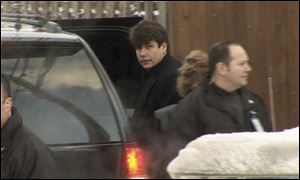
Efforts to remove governor intensify before he fills seat
12/11/2008
Gov. Rod Blagojevich leaves his home to go to work in his office in Chicago, a day after his arrest on federal corruption charges.
CHICAGO - Gov. Rod Blagojevich of Illinois returned to work here yesterday amid whirlwind efforts across the state and country to remove him from office before he could make an appointment to the vacant U.S. Senate seat at the root of a criminal case against him.
In what the lieutenant governor, Pat Quinn, called a "crisis situation," Illinois lawmakers scrambled to find a way to force the governor's exit while President-elect Barack Obama called for his resignation and Sen. Harry Reid, the majority leader, warned him that he should "under no circumstances make an appointment."
"This is a crisis of confidence of people in their government in a democracy," Mr. Quinn said, in an interview from the same downtown office building where Mr. Blagojevich, a two-term Democrat, was said by a staff member to be having meetings. "The governor has to resign, or at the very least step aside."
At the same time, some of the elements sketched out in a 76-page criminal complaint against Mr. Blagojevich on Tuesday came into focus, as federal authorities identified Rep. Jesse Jackson, Jr., of Illinois as the potential Senate candidate who was described in the complaint as the most intertwined with the governor in deal-making for the empty seat.
Mr. Jackson, a Democrat, angrily denounced Mr. Blagojevich at a news conference in Washington, saying he had done nothing wrong and did not know that the selection process had been corrupted.
The identity of another important figure in the case against Mr. Blagojevich - known only as "Individual A" in the complaint - also became apparent yesterday. Law enforcement officials said he was John Wyma, a lobbyist, fund-raiser, and close adviser to Mr. Blagojevich, who went to the federal authorities in October with tales of corruption that helped lead to the use of wiretaps on Mr. Blagojevich and eventually to the governor's arrest on Tuesday on charges of conspiracy and soliciting bribes.
Mr. Wyma's assertions did not center on the vacant Senate seat but on different accusations of corruption included in the case against the governor. The lobbyist said Mr. Blagojevich was improperly squeezing recipients of state aid for large contributions in an effort to amass a $2.5 million campaign fund before Jan. 1, the day a new state law takes effect barring contributions from state contractors.
Mr. Blagojevich's spokesman and lawyer did not return calls for comment yesterday, and the governor made no statements nor public appearance outside his office. That he went to his Chicago office at all was considered some sort of statement, however, because the governor is known to avoid his offices here and in Springfield to work alone at his North Side home or some other unofficial location.
A lawyer for Mr. Blagojevich, who turned 52 yesterday, said Tuesday that the governor denied any wrongdoing.
Lisa Madigan, the state's attorney general - who has also been suggested as a possible Senate appointee and was identified in the complaint as "Senate Candidate Two" - said she was weighing whether to file a complaint with the state Supreme Court seeking to declare the governor unfit to serve. Meanwhile, she said, state legislators were considering, perhaps as early as next week, a move to conduct impeachment proceedings against the governor.
She and Mr. Quinn, both Democrats, said they were working on plans to create a special election to choose the next senator. The Senate seat became empty with the election of Mr. Obama as president in November, and under state law, the governor is assigned to name a replacement to fill the remainder of the term, which runs through 2010.
"He doesn't show any signs of resigning or any willingness to do that," Ms. Madigan said.
Also yesterday, one of Mr. Blagojevich's top deputies resigned after he was tied to the rampant corruption scandal surrounding the governor. He became the first member of the governor's inner circle to fall amid the accusations.
Deputy Gov. Bob Greenlee, 33, stepped down a day after Mr. Blagojevich was arrested on federal corruption charges.
The complaint against Mr. Blagojevich identifies a "Deputy Governor A" who is deeply involved in an alleged scheme to strong-arm the Chicago Tribune on the orders of the governor and his wife. When asked if his client was the deputy governor, Mr. Greenlee's attorney, David Stetler, did not dispute it.
Mr. Stetler told the Associated Press the reason behind Mr. Greenlee's resignation "should be obvious."
A "deputy governor" is simply a high-ranking aide, much like a chief of staff. Deputy governors have no constitutional power and are entirely separate from the lieutenant governor, the state official who would replace Mr. Blagojevich if he resigns.
Governor Blagojevich may be trying to hold on to the most potent bargaining power he has - that of resignation should he enter into talks about a plea deal with federal prosecutors - some experts suggested.
"If I were his lawyer, I'd sit down with him soon and say this case is not winnable, you're going to the penitentiary pretty soon, and the only question is for how long," said Albert Alschuler, a professor of law and criminology at the University of Chicago Law School and a prominent expert on legal issues in Illinois. "Your bargaining power is greater today than it ever will be. The big question is whether the U.S. attorney's office would be willing to make some sentencing concessions in exchange for a resignation from office."